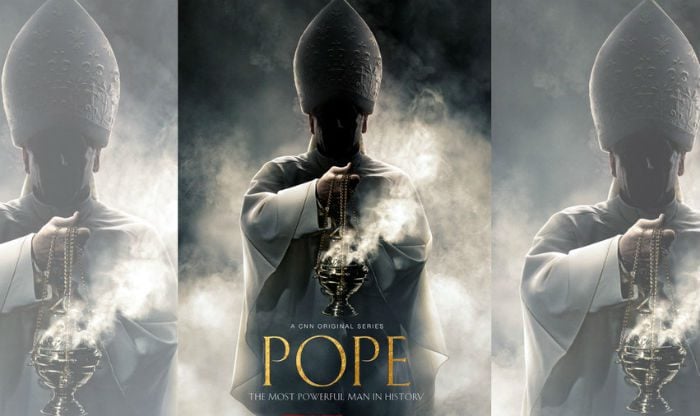 If the story of Catholicism is told poorly, that may be because Catholics are very seldom the ones telling it.
If the story of Catholicism is told poorly, that may be because Catholics are very seldom the ones telling it.
Premiering Sunday, March 11, CNN’s six-part “Pope: The Most Powerful Man in History” — CNN provided episodes 101 and 104 — is the same old, same old. It’s not so much as a documentary or an investigation, but a litany of received secular wisdom about the Church, a lot of it incomplete, cursory or just plain wrong, set to very dramatic music.
Narrated with gravity by Liam Neeson, its purports to be a history of the papacy, but near as I can tell, the Catholic presence in it is relatively minimal. It features lots of scholars of various sorts, some familiar from similar documentaries.
Rather than offering real insights, they generally say fairly bland and obvious things that could be handled in narration. The only Catholics I remember seeing in the episodes provided to me were Irish historian Eamon Duffy, Cardinal Wuerl of Washington, D.C., and Catholic Congressman Jeff Fortenberry (R-Nebraska).
(The press materials say that Bishop Paul Tighe and Vatican journalist John Thavis are also interviewed.)
Otherwise, it commits a similar sin to one I perceived in author Jon Krakauer’s “Under the Banner of Heaven,” his nonfiction book dealing with fundamentalist offshoots of Mormonism. While the polygamist abuses it outlines are verified, in discussing the mainstream Church of Jesus Christ of Latter-Day Saints and its doctrines, it talks mostly to former Mormons and opponents, rather than including some faithful Mormons.
That may be because they wouldn’t talk to him, or it may be the modern assumption that, in discussing religion, one can only trust the voices of secularists and apostates rather than believers. I certainly wouldn’t defend the beliefs of the LDS Church, but I don’t like unfairness, either.
Also notably absent in the episodes I saw was the Church’s role in establishing schools, hospitals and the university; and its care of the poor, lepers, orphans and outcasts, especially when nobody else was doing it (which is much of the last couple of thousand years, until the last 200 or so). Popes had a bit to do with all those, as well.
Throughout the two episodes I saw of “Pope” was a whiff of condescension bordering on anti-Catholicism, a sort of “Oooh, it’s big and fancy and old, but you know, it’s really rubbish under all that frippery.”
Especially in the second episode provided (which was numbered 4), dealing with Martin Luther and the Reformation, one gets the definite feeling that the writers of the narration view Martin Luther as a great hero, and that the Church got its comeuppance, paving the way for a far better version (or versions) of Christianity. Obviously we don’t think so, but the idea that the Reformation may have not been an unreservedly wonderful thing, is never entertained.
As for accuracy, the first episode claims Constantine the Great was a “Christian emperor.” While his mother was Christian, and he did promulgate laws legalizing the practice of Catholicism in the Roman Empire, he was never baptized himself until nearly on his deathbed. He allowed the Church to exist and flourish, but he was far more interested in building his temporal empire than any higher religious purpose.
For that matter, the episode leaps from the death of Peter to Constantine, quickly passing over several centuries and all the Early Church Fathers. It was under their leadership in the first years and decades of the Faith, that the Church established its structure, the Mass and many doctrines. If you read their writings, the Church of today can be quite easily recognized in these early years. Constantine legalized the Church, but he didn’t build it. It was already built before he was born.
The episode’s treatment of the Crusades follows the view of them held since the late 19th-century: that, with brief lip service to the real danger posed to Christians under Muslim conquest — in the Middle East and Europe — that the Church’s forays into the Holy Land were entirely wrong, and that the Kurdish Muslim Saladin was a model of benevolence and tolerance. The truth is way more complicated than that, but the CNN producers showed no inclination to do anything but skim the surface.
In the second episode, the question of the sales of indulgences comes up again, and old myths about them are resurrected to beat the Church over the head. The Renaissance popes got up to all sorts of reprehensible things (as did a whole lot of folks during the Renaissance) — and the experts quoted show the correct attitude of righteous repugnance — but at least on this topic, here’s what Catholic Answers has to say:
Myth 6: A person can buy indulgences.
The Council of Trent instituted severe reforms in the practice of granting indulgences, and, because of prior abuses, “in 1567 Pope Pius V canceled all grants of indulgences involving any fees or other financial transactions” (Catholic Encyclopedia). This act proved the Church’s seriousness about removing abuses from indulgences.
Myth 7: A person used to be able to buy indulgences.
One never could “buy” indulgences. The financial scandal surrounding indulgences, the scandal that gave Martin Luther an excuse for his heterodoxy, involved alms—indulgences in which the giving of alms to some charitable fund or foundation was used as the occasion to grant the indulgence. There was no outright selling of indulgences. The Catholic Encyclopedia states: “[I]t is easy to see how abuses crept in. Among the good works which might be encouraged by being made the condition of an indulgence, almsgiving would naturally hold a conspicuous place. . . . It is well to observe that in these purposes there is nothing essentially evil. To give money to God or to the poor is a praiseworthy act, and, when it is done from right motives, it will surely not go unrewarded.”
But, no one asked them, or anyone like them, probably under the assumption, “Of course, they’re going to say that, they’re Catholic.” Well, by that logic, what do you expect Protestants or secularists to say, since they’re Protestants and secularists?
In short, there’s very little reason to watch “Pope: The Most Powerful Man in History.” It adds nothing new or original to the conversation; it repeats old tropes; and it talks to very few Catholics (but plenty of scholars and non-Catholic Christians). You do get to see the first-century Didache brought out of storage and given a rare showing on TV — with an Orthodox cleric handling it without gloves. Sheesh.
The best thing I can say is to quote Oscar Wilde (another deathbed Catholic convert), who observed, “The only thing worse than being talked about is not being talked about.”
If you still want to devote some hours to Church history, try Bishop Barron’s “Catholicism” and its sequel “The Pivotal Players.” You’ll get better history and better theology.
But, if you’re still game, from CNN:
Pope will stream live for subscribers on March 11 via CNNgo (at CNN.com/go and via CNNgo apps for Apple TV, Roku, Amazon Fire, Samsung Smart TV and Android TV), and on the CNN mobile apps for iOS and Android. Moreover, the series will be available the day after the broadcast premiere on demand via cable/satellite systems, CNNgo platform and CNN mobile apps.
Pope: The Most Powerful Man in History will regularly air Sunday nights at 10 p.m. ET/PT.
Image: Courtesy CNN
Don’t miss a thing: head over to my other home, as Social Media Manager at Family Theater Productions; and check out FTP’s Faith & Family Media Blog, and our YouTube Channel.













